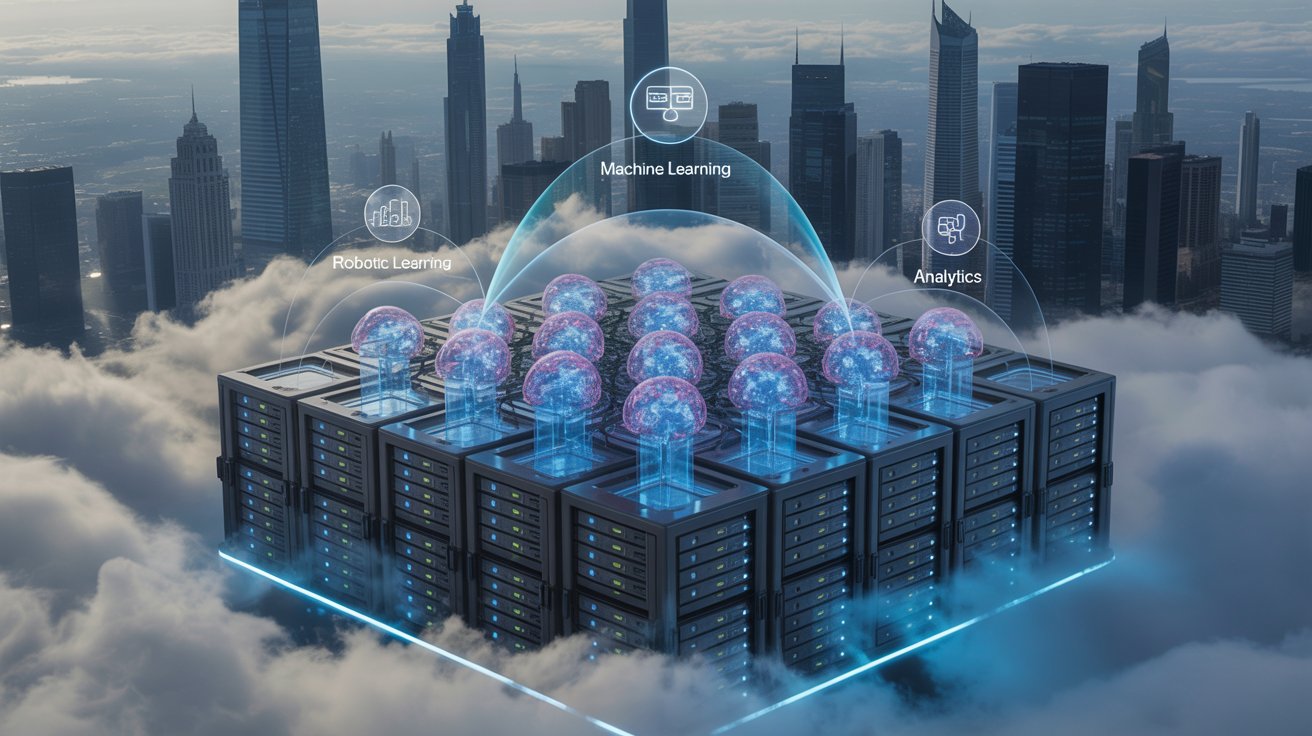In today’s digital-first world, artificial intelligence (AI) has moved from science fiction to mainstream business strategy. Whether it’s powering recommendation engines, analyzing customer data, or building autonomous systems, AI has become the heartbeat of modern innovation. But what many don’t realize is this: without robust cloud computing infrastructure, none of it would be possible.
From tech startups in Silicon Valley to Fortune 500 firms across the U.S., companies are relying heavily on cloud platforms to develop, train, and deploy AI applications at scale. The synergy between AI and cloud computing is what’s making this rapid evolution possible.
Let’s dive deep into how cloud infrastructure supports AI, why it matters, and what businesses and developers need to know to stay competitive.
Why Cloud Computing is Critical for AI
Developing AI models isn’t just about clever algorithms. It demands significant computing power, large-scale data storage, and flexible resources — all of which are core strengths of cloud computing.
Here’s why cloud computing has become the foundation for AI development:
- Scalability: AI training requires high processing power. Cloud platforms like AWS, Google Cloud, and Microsoft Azure allow developers to scale resources up or down as needed.
- Cost Efficiency: Instead of investing in expensive on-premises infrastructure, businesses can pay-as-they-go for GPU instances or storage.
- Speed to Market: Cloud-based AI tools and APIs reduce development cycles, helping companies launch AI features faster.
- Collaboration: Teams across different geographies can work on shared AI projects via the cloud, improving productivity and innovation.
For companies in the U.S., especially those navigating tight budgets or rapid growth, this flexibility is a game-changer.
Key Components of AI-Ready Cloud Infrastructure
Building AI on the cloud requires more than just spinning up a few virtual machines. There are several core components that make a cloud platform AI-ready:
1. High-Performance Computing (HPC)
AI workloads often involve massive datasets and deep neural networks. Cloud providers now offer HPC solutions with powerful GPUs, TPUs, and specialized AI chips.
Example:
- NVIDIA A100 GPUs on AWS EC2 and Azure NC-series VMs are purpose-built for AI training and inference.
2. Data Storage and Management
AI systems are only as good as the data they use. Cloud infrastructure offers various storage options including:
- Object storage (e.g., Amazon S3, Google Cloud Storage)
- Data lakes
- Cloud-native databases (like BigQuery or Azure Synapse)
These solutions support petabytes of data with high durability and availability.
3. AI/ML Frameworks and Tools
Cloud platforms now come with pre-installed frameworks like TensorFlow, PyTorch, and Scikit-learn. Many also offer AutoML tools, allowing users to build models without deep coding expertise.
4. Orchestration and Pipelines
To manage complex AI workflows, cloud platforms support tools like:
- Kubernetes for container orchestration
- Kubeflow for ML pipelines
- MLflow for model tracking and versioning
This ensures that AI development is reproducible, scalable, and easily maintained.
Popular Cloud Platforms for AI in the U.S.
Here’s how some of the leading cloud providers compare when it comes to AI capabilities:
1. Amazon Web Services (AWS)
AWS is the market leader in cloud and offers a rich ecosystem for AI:
- SageMaker for end-to-end machine learning
- Pre-trained models for text, image, and speech recognition
- Powerful EC2 instances optimized for deep learning
AWS also supports AI in industries like healthcare, automotive, and finance, with compliance-ready tools.
2. Google Cloud Platform (GCP)
GCP shines in AI thanks to its deep integration with TensorFlow and its custom TPU hardware.
- Vertex AI makes it easier to deploy and manage ML models
- Tools like AutoML, BigQuery ML, and Dialogflow enable developers and non-developers alike
- Google’s strength in AI research is reflected in its offerings
3. Microsoft Azure
Azure integrates tightly with enterprise tools like Office 365 and Azure Active Directory.
- Azure Machine Learning Studio for visual ML development
- Cognitive Services for NLP, vision, and speech capabilities
- Scalable GPU-powered virtual machines
Azure is a popular choice for companies looking to integrate AI with existing enterprise workflows.
Real-World Applications Enabled by AI in the Cloud

Across the U.S., businesses are using cloud-based AI in innovative ways:
- Retail: Personalized product recommendations, dynamic pricing, and inventory forecasting
- Healthcare: Diagnostic imaging analysis, patient risk prediction, and drug discovery
- Finance: Fraud detection, algorithmic trading, and customer support chatbots
- Manufacturing: Predictive maintenance, defect detection, and robotic automation
Thanks to cloud computing, these applications are accessible even to small- and mid-sized companies without large IT departments.
Security, Compliance, and Governance
With great power comes great responsibility. Storing sensitive data and running AI in the cloud raises important questions about:
- Data privacy: How is personal information protected?
- Model explainability: Can AI decisions be audited?
- Compliance: Does the infrastructure meet HIPAA, GDPR, or SOC 2 standards?
Top cloud providers offer comprehensive compliance documentation, encryption protocols, and identity management tools to ensure that AI is not only powerful—but also safe and trustworthy.
Future Trends: What’s Next for AI and the Cloud?
As both AI and cloud technologies evolve, we can expect a few exciting trends in the U.S. market:
- Serverless AI: Platforms will allow developers to deploy models without managing any infrastructure at all.
- Edge + Cloud AI: Hybrid models will enable inference at the edge (closer to users) while training happens in the cloud.
- Industry-specific Clouds: Providers will offer pre-configured environments for sectors like healthcare, education, and logistics.
And as quantum computing and 5G continue to mature, the capacity of cloud platforms to handle more complex AI tasks will grow exponentially.

